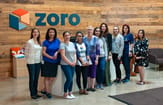Hiring the right people is one of the hardest and most critical parts of growing a startup. But the first hire can be the most difficult, with so much of your company's future success riding on their commitment to the mission — and ability to do the work.
We talked to some Chicago tech successes about how their first hires helped them get off the ground.

Answers from LearnCore co-founder and chief operating officer Ethan Linker. He founded the company with a friend in 2010 to help professionals build skills with digital tools fit for modern learning.
What did you look for in you first employees?
Since neither founder was technical, it was clear that our first hire had to be an engineer. We looked for someone who could execute on a vision. Someone who didn't need mountains of documentation to build a product. They needed to share in our vision, and be eager to live beyond a title. It's critical to have a dynamic person regardless of role.
How did that inform future hiring?
That first hire is critical because they set most of the cultural baselines that will happen at your company. So whether they work in the morning, or come in late; use a particular software, or dress a particular way, etc; all future hires look to the first "employee" for company norms.
Any advice to young founders about how to start hiring?
Several: 1) Listen to and trust your gut. If something doesn't feel right, you are probably correct. 2) Treat equity as if your company is already worth $100M. 3) Be straight up, the person coming in needs to be well informed. If they are shocked, they will just leave. 4) Cheap isn't always better. Your first few hires all need to be player-coaches. 5) Hire based on future business impact; not prior titles.

Answers from RedShelf co-founder and chief financial officer Tim Haitaian. The company helps schools and students adopt digital textbooks by making them more affordable and useful than their paper predecessors.
What did you look for in you first employees?
In the beginning, it was important for us to hire someone we knew well and could trust. Those were the two qualities we looked for, but another crucial one was someone who could easily mold themselves into a variety of roles and act as a generalist until we could hone in on their specialties
How did that inform future hiring?
Our initial hires shaped the culture of RedShelf, and who we will continue to align ourselves with in the future. Our first hires since the inception of the company ended up building the foundation of who we are today.
Any advice to young founders about how to start hiring?
My advice is to seek individuals that have an eagerness to learn with the ability to adapt and react to new challenges. One quality you definitely want to find in your first hires are people you can trust and vice-versa as you take on the startup lifestyle.

Answers from Pay Your Selfie CEO Michelle Smyth. With its mobile selfie survey technique that uses advanced machine learning and image analysis, Pay Your Selfie is able to get info that traditional surveys can't capture.
What did you look for in your first employees?
Job skills are table stakes these days. Startups require more — we need competencies, adaptability and the right aptitude and attitude for taking on challenges and problem-solving.
The first thing I look for is excitement: does this person recognize and believe in the disruptive opportunity we're going after?
Next, I look for their willingness to embrace uncertainty: are they willing to forgo corporate comforts and bigger paychecks to pursue the vision?
Then, I look for grit: How do they approach adversity? It's critical to build a team of enthusiastic problem-solvers who don't get crushed by pressure. It's easy to revel in the good times. But when things suck, and they will, is this a person who will come up with new ideas and test them to regain momentum?
How did that inform future hiring?
As a founder, you don't have time to waste on interviewing passive people. You need to quickly identify if someone truly connects with your business. If they do, the wheels start turning. You can see it on their face and in their body language. They lean forward, ask questions, and may start brainstorming on the spot. Once you've found someone who's engaged with your idea, then shift gears. Don't ask about all the good stuff they've done. Hone in on their worst experiences they've had in prior roles. What happened, and how did they survive those times? You'll learn about their grit.
Any advice to young founders about how to start hiring?
Your gut instinct is powerful. Listen to it. During the interview process, recognize warning bells. A potential hire might have all the right experience, but if your personalities don't gel or you hear pervasive negative tones about previous experiences, it will never work.
Images via participating companies, Greg Rothstein/1871.
What's your company working on? Send us a tip or tweet us @BuiltInChicago







